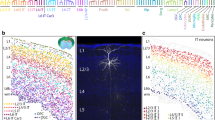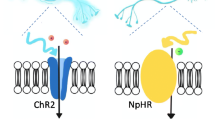Abstract
NMDA receptors are necessary for both synaptic potentiation and depression, but the precise location of these receptors has not been established. By loading MK-801 into pre- or postsynaptic neurons during paired recordings of synaptically connected layer 4 and layer 2/3 neurons in mouse barrel cortex, we found that synaptic potentiation requires postsynaptic, but not presynaptic, NMDA receptors, whereas synaptic depression requires presynaptic, but not postsynaptic, NMDA receptors.


Similar content being viewed by others
References
Feldman, D.E. & Brecht, M. Science 310, 810–815 (2005).
Dan, Y. & Poo, M.M. Physiol. Rev. 86, 1033–1048 (2006).
Markram, H., Lubke, J., Frotscher, M. & Sakmann, B. Science 275, 213–215 (1997).
Bi, G.Q. & Poo, M.M. J. Neurosci. 18, 10464–10472 (1998).
Debanne, D., Gahwiler, B.H. & Thompson, S.M. J. Physiol. (Lond.) 507, 237–247 (1998).
Feldman, D.E. Neuron 27, 45–56 (2000).
Sjostrom, P.J., Turrigiano, G.G. & Nelson, S.B. Neuron 39, 641–654 (2003).
Liu, L. et al. Science 304, 1021–1024 (2004).
Massey, P.V. et al. J. Neurosci. 24, 7821–7828 (2004).
Berberich, S. et al. J. Neurosci. 25, 6907–6910 (2005).
Morishita, W. et al. Neuropharmacology 52, 71–76 (2007).
Bender, V.A., Bender, K.J., Brasier, D.J. & Feldman, D.E. J. Neurosci. 26, 4166–4177 (2006).
Nevian, T. & Sakmann, B. J. Neurosci. 26, 11001–11013 (2006).
Mierau, S.B., Meredith, R.M., Upton, A.L. & Paulsen, O. Proc. Natl. Acad. Sci. USA 101, 15518–15523 (2004).
Brasier, D.J. & Feldman, D.E. J. Neurosci. 28, 2199–2211 (2008).
Acknowledgements
This work was supported by the Medical Research Council (grant number G0400571) and by an equipment grant from the Alzheimer's Research Trust. A.R.-M. holds a Marie Curie Intra-European Fellowship.
Author information
Authors and Affiliations
Contributions
A.R.-M. conducted the experiments and analyzed the data. A.R.-M. and O.P. designed the experiments and wrote the manuscript.
Corresponding authors
Supplementary information
Supplementary Text and Figures
Supplementary Figures 1–3 and Supplementary Methods (PDF 194 kb)
Rights and permissions
About this article
Cite this article
Rodríguez-Moreno, A., Paulsen, O. Spike timing–dependent long-term depression requires presynaptic NMDA receptors. Nat Neurosci 11, 744–745 (2008). https://doi.org/10.1038/nn.2125
Received:
Accepted:
Published:
Issue Date:
DOI: https://doi.org/10.1038/nn.2125
- Springer Nature America, Inc.
This article is cited by
-
The effects of the NMDAR co-agonist d-serine on the structure and function of optic tectal neurons in the developing visual system
Scientific Reports (2023)
-
A calcium-based plasticity model for predicting long-term potentiation and depression in the neocortex
Nature Communications (2022)
-
Aberrant maturation and connectivity of prefrontal cortex in schizophrenia—contribution of NMDA receptor development and hypofunction
Molecular Psychiatry (2022)
-
Interplay of different synchronization modes and synaptic plasticity in a system of class I neurons
Scientific Reports (2022)
-
Memristive device with highly continuous conduction modulation and its underlying physical mechanism for electronic synapse application
Science China Materials (2021)





